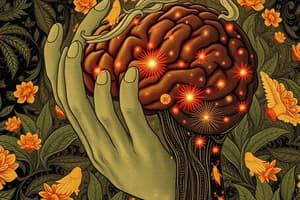Podcast
Questions and Answers
What type of memory is responsible for skilled actions like driving a car or swimming?
What type of memory is responsible for skilled actions like driving a car or swimming?
- Procedural memory (correct)
- Short-term memory
- Semantic memory
- Sensory memory
Which memory process involves the conscious repetition of information to be remembered?
Which memory process involves the conscious repetition of information to be remembered?
- Retrieval
- Rehearsal (correct)
- Relearning
- Suggestibility
What is the tendency for an individual to have better memory for information that relates to themselves?
What is the tendency for an individual to have better memory for information that relates to themselves?
- Procedural memory
- Semantic encoding
- Retrograde amnesia
- Self-reference effect (correct)
Which type of memory stores information about words, concepts, and language-based knowledge?
Which type of memory stores information about words, concepts, and language-based knowledge?
What is the process of getting information out of long-term memory and back into conscious awareness?
What is the process of getting information out of long-term memory and back into conscious awareness?
What is the process of actively rehearsing information to move it from short-term memory to long-term memory called?
What is the process of actively rehearsing information to move it from short-term memory to long-term memory called?
Which of the following is NOT a type of long-term memory?
Which of the following is NOT a type of long-term memory?
What is the term for exceptionally clear recollections of important events?
What is the term for exceptionally clear recollections of important events?
Which of the following best describes the misinformation effect paradigm?
Which of the following best describes the misinformation effect paradigm?
What term refers to memories we consciously try to recall, as opposed to implicit memories?
What term refers to memories we consciously try to recall, as opposed to implicit memories?
Flashcards
Anterograde Amnesia
Anterograde Amnesia
Loss of memory for events after brain trauma.
Explicit Memory
Explicit Memory
Memory we consciously try to remember and recall.
Flashbulb Memory
Flashbulb Memory
Exceptionally clear recollection of an important event.
Encoding
Encoding
Signup and view all the flashcards
Chunking
Chunking
Signup and view all the flashcards
Misattribution
Misattribution
Signup and view all the flashcards
Misinformation Effect
Misinformation Effect
Signup and view all the flashcards
Mnemonic Device
Mnemonic Device
Signup and view all the flashcards
Self-Reference Effect
Self-Reference Effect
Signup and view all the flashcards
Short-Term Memory (STM)
Short-Term Memory (STM)
Signup and view all the flashcards
Study Notes
Types of Memory
- Absentmindedness: lapses in memory caused by breaks in attention or focus
- Amnesia: loss of long-term memory due to disease, physical trauma, or psychological trauma
- Anterograde amnesia: loss of memory for events that occur after brain trauma
- Declarative memory: type of long-term memory of facts and events we personally experience
- Episodic memory: type of declarative memory containing information about events we have personally experienced
- Explicit memory: memories we consciously try to remember and recall
- Flashbulb memory: exceptionally clear recollection of an important event
- Long-term memory (LTM): continuous storage of information
- Procedural memory: type of long-term memory for making skilled actions
- Semantic memory: type of declarative memory about words, concepts, and language-based knowledge and facts
Memory Processes
- Acoustic encoding: input of sounds, words, and music
- Automatic processing: encoding of informational details like time, space, frequency, and the meaning of words
- Chunking: organizing information into manageable bits or chunks
- Effortful processing: encoding of information that takes effort and attention
- Encoding: input of information into the memory system
- Memory consolidation: active rehearsal to move information from short-term memory into long-term memory
- Rehearsal: conscious repetition of information to be remembered
- Retrieval: act of getting information out of long-term memory storage and back into conscious awareness
- Storage: creation of a permanent record of information
Memory Errors
- Bias: how feelings and view of the world distort memory of past events
- Misattribution: memory error in which you confuse the source of your information
- Misinformation effect: paradigm after exposure to incorrect information, a person may misremember the original event
- Persistence: failure of the memory system that involves the involuntary recall of unwanted memories
- Suggestibility: effects of misinformation from external sources that leads to the creation of false memories
Other Memory Concepts
- Atkinson-Shiffrin model (A-S): memory model that states we process information through three systems: sensory memory, short-term memory, and long-term memory
- Mnemonic device: memory aids that help organize information for encoding
- Recognition: identifying previously learned information after encountering it again
- Recall: accessing information without cues
- Self-reference effect: tendency for an individual to have better memory for information that relates to oneself
- Sensory memory: storage of brief sensory events
- Short-term memory (STM) (also, working memory): holds about seven bits of information before it is forgotten or stored
- Visual encoding: input of images
Studying That Suits You
Use AI to generate personalized quizzes and flashcards to suit your learning preferences.




